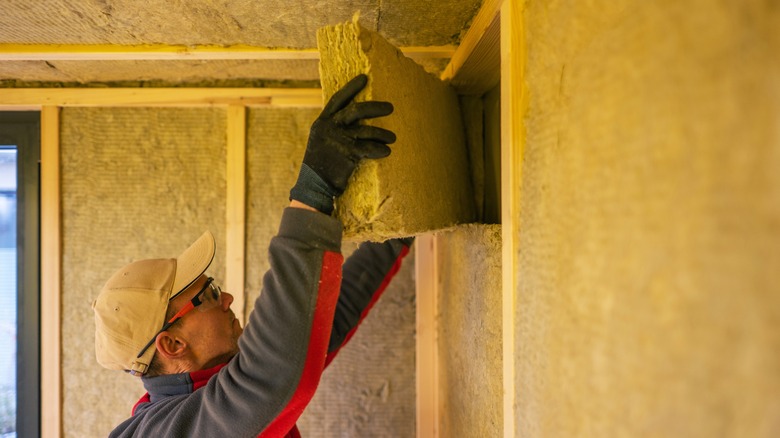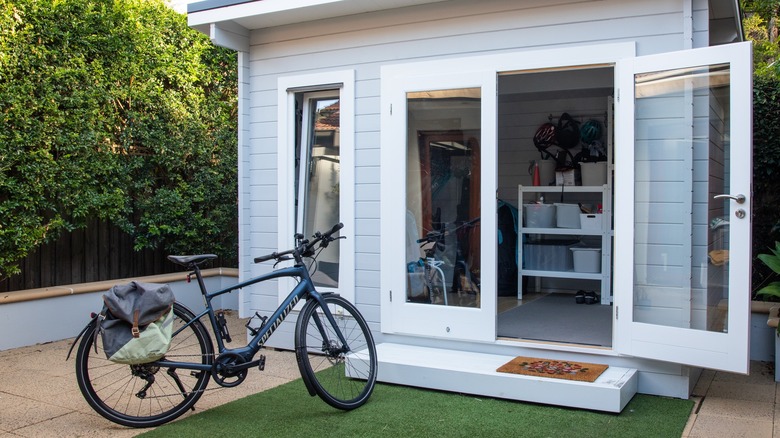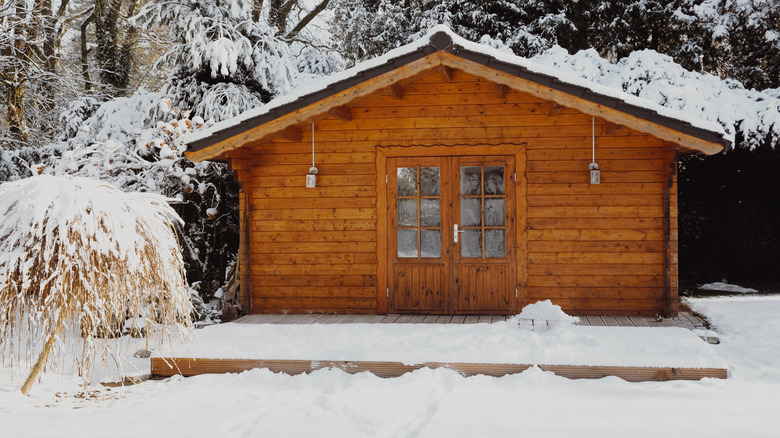Should You Add Insulation To Your Shed? It Depends On These Factors
With the rise of she-sheds and other nontraditional storage units, there are various factors to consider when it comes to the construction process, particularly with wooden sheds. "To insulate or not to insulate" is one of them. Insulating a shed provides the obvious benefits of keeping it warm in the winter and cool in the summer. This protective barrier doesn't just provide temperature comfort; it protects the shed's contents too. So when deciding if you'll insulate your shed in your garden or yard, consider the purpose of the unit and the weather in your area throughout the year.
Should you decide that your shed needs insulation, you'll want to take into account the cost and labor associated with installation — which may also sway your decision. The cost depends on the size and style of the shed and the person you choose to do the work. You can hire a contractor to do it, but you can also DIY! It's important to note that even if you turn down insulation once, you can always change your mind, assuming the shed is still in decent shape. So you might have a wooden shed built initially for storing bikes, garden equipment, lawn chairs, etc. before later deciding to convert it to a small guest bedroom. It can be done!
What is the purpose of your shed?
Some people use sheds for tools, lawnmowers, and other outdoor items while others store more delicate items that would typically be stored in a closet. Many homeowners don't use their sheds for storage at all, converting backyard sheds into living spaces or recreational areas. Your shed might become a cozy reading nook or a hobby studio. The purpose of your shed should drive the decision on whether or not you insulate it.
Typically, keeping tools, bicycles, and similar items in a shed year-round won't create any issues, unless the shed has gaps in the roof or walls where water can get in. So if your shed was built well, and you plan to use it only for outdoor items that can't be damaged by hot or cold temps, you can save time and money by skipping the insulation. You may find spiders and other bugs inside, though, but even insulation won't guarantee that these small pests won't make your shed their mansion.
On the other hand, if you plan to use your shed for clothing, shoes, or blankets, insulating would be a wise choice. These items can be damaged from moisture or temperature if left exposed in a shed during inclement weather, so either insulate the shed or store them in an airtight, plastic container. You should also opt for insulation if you plan to use the shed for living space, which will provide comfort and protection for furniture and anything else inside.
What is the climate like where you live?
If you've ever lived in one of the northernmost states of the United States in the winter, you know about the frigid temps and snow. Or perhaps you live in one of the southernmost portions of the country and have experienced that unpleasant triple-digit heat in the summer. Both extreme heat and extreme cold can be dangerous, not just to humans and animals, but to whatever's inside an uninsulated shed. Cans of paint, fabrics, wood furniture, books, and electronics are just a few of the many items that can be destroyed by extreme temperatures in a shed. If you live in an area with scorching summers or freezing winters and plan to store these or similar items in your shed, insulation will help protect them.
Or perhaps you're reading this from the comfort of your home in Honolulu, San Diego, or another western coastal city where temps are relatively comfortable year-round. If you live in an area with a moderate climate, you may not need to insulate your shed unless you want to use it as a living space. Otherwise, it may never get hot enough or cold enough to pose a risk to anything you choose to store in the unit. Regardless of where you live or what you plan to use your shed for, keep in mind that whether or not you insulate your shed is up to you, based on what you use the space for and what kind of climate you live in.


